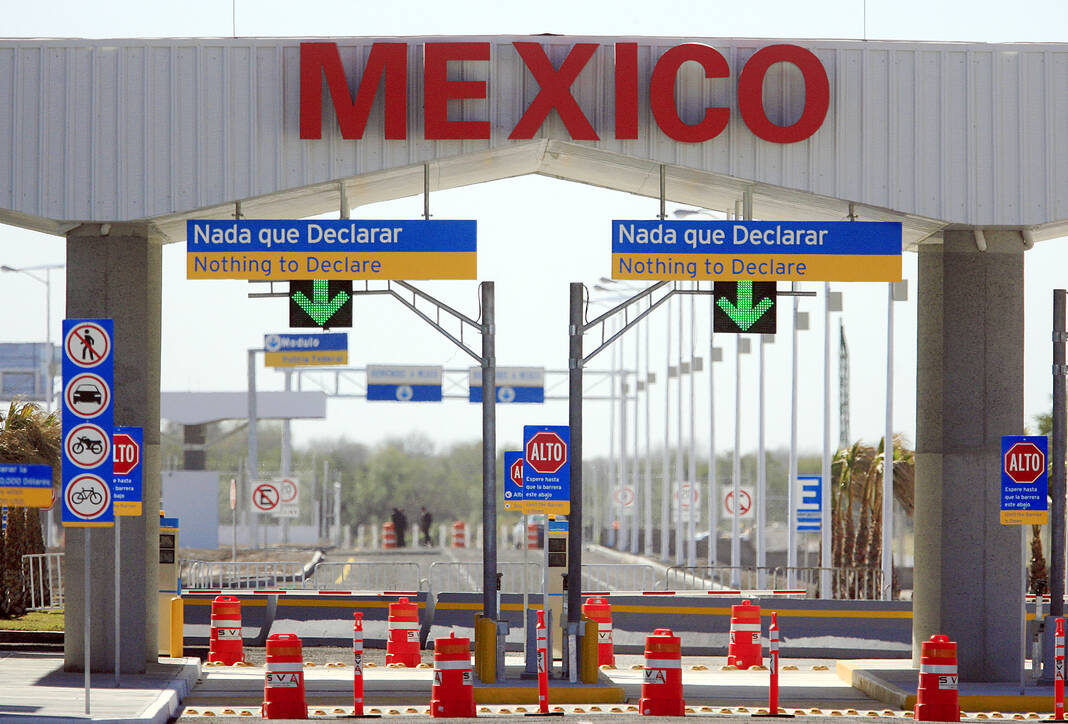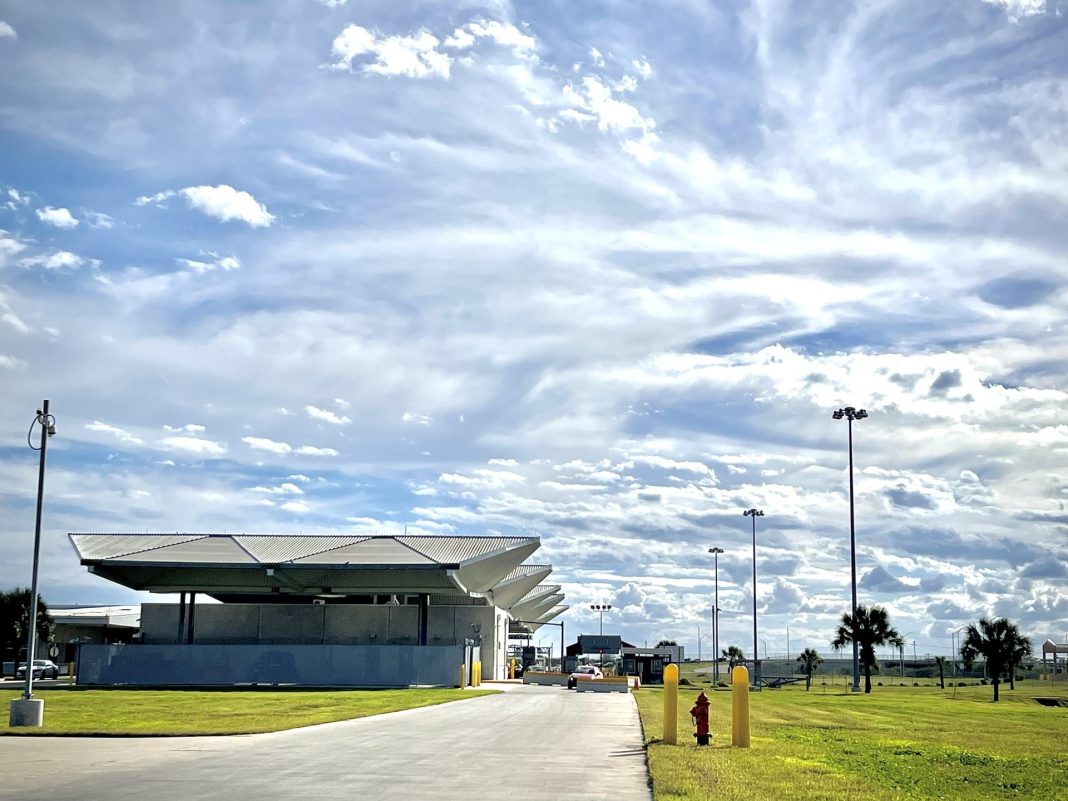|
Only have a minute? Listen instead
Getting your Trinity Audio player ready...
|
After nixing plans in December to borrow nearly $60 million to fund the expansion of the Donna-Rio Bravo International Bridge, city leaders will instead ask voters to decide the matter via a bond election this May.
Voters will be asked to approve borrowing up to $45 million in general obligation bonds to fund the construction of two northbound lanes for commercial truck traffic at the bridge.
Previously, the city was set to put some $58.8 million in revenue bonds on the market. However, in December, Donna reneged on those plans after a new mayor and a new majority took control of the city council.
Donna had been just days away from putting the revenue bonds on the market, which would have been secured by the toll revenues generated by bridge traffic, said Andre Ayala, public finance director for the city’s financial advisers, Hilltop Securities.
The last hurdle Donna had to leap before putting the debt for sale was getting a final stamp of approval from the Texas Attorney General’s Office, which, by law, must approve of all public debt obligations.
But that all came to a halt less than a week after Mayor David Moreno and two new councilmen, Ernesto Lugo and Jesse “Coach” Jackson, took office.
At the time, Moreno said he wasn’t against the bridge expansion, but was concerned over how the city was attempting to fund the project and the lack of transparency that even he, as a city commissioner for the previous three years, could not pierce past.
“I’m not against, totally against the bridge. I think it’s a great idea … but I think we just need to take a closer look at it when it comes to the financing part of it,” Moreno said after that Dec. 19, 2023 meeting.
Two months later, city leaders have brought a new idea to the table — asking Donna voters to approve borrowing a smaller amount of money via a general obligation bond — debt that will be backed by the city’s taxing authority.
“What we did was to rerun the numbers — same project, it’s just a different way of doing it. We now have a bond election here in an amount not to exceed $45 million, that’s what we’re calculating,” Ayala explained during a city council meeting on Tuesday.

Pursuing a general obligation bond will allow Donna to capitalize on the city’s better credit rating to secure a lower interest rate. Doing so will result in millions of dollars saved, Ayala said.
Donna would be able to reduce the principal amount borrowed by $15 million, which would, in turn, save millions more in accrued interest that would have to be paid over the 30-year life of the debt.
“You would now be issuing a general obligation bond approved by the voters of Donna, be paid by the revenues from the bridge, but you would have an approved bond with the full faith and credit of the city. You bring that rating from a triple-B to an A-rating,” Ayala said.
Ayala was referring to the “BBB” bond investment rating the revenue bond proposal received from Standard and Poors last year during the course of preparing for the debt issuance.
However, the city itself enjoys an “A” rating, which gives it better bargaining power to secure lower interest rates.
Investors typically view revenue bonds as a riskier investment since they are backed almost exclusively by revenues generated from a specific source, such as tolls or lease fees, according to an explainer posted to the U.S. Securities and Exchange Commission website.
As a result, investors will look for more of what Ayala characterized as “safeguards,” such as higher interest rates, when it comes to betting on the success of revenue bonds.
General obligation bonds, however, are more often seen as safer investments because they are backed by a governmental entity’s taxing authority. That means that if a city pledges money from other funding sources to repay a debt, but those sources fall short, then the city can — and often must — leverage property taxes to repay the debt.
“(G)eneral obligation (bonds) are backed by the ‘full faith and credit’ of the issuer, which has the power to tax residents to pay bondholders,” the SEC website states.
But city leaders downplayed the potential ramifications of a general obligation bond during its discussions on Tuesday.

Indeed, though Ayala repeatedly used the phrase “the full faith and credit of the city” in describing the merits of a general obligation bond, he never once mentioned that the debt could potentially require a tax levy should bridge tolls fall short of projections.
“Right now, we’re talking about a general obligation bond that has to be approved by the voters, which means, full faith and credit of the city, but the city will use the bridge revenue to pay for the bond,” Ayala said.
“There is no tax increase assumption here whatsoever. The old program worked; this one just works better. But you have to get it approved by your voters to make this work,” Ayala said.
Instead, Ayala spoke of how the general obligation bond debt structure would allow Donna to tap into bridge revenues sooner, and how that could allow the city to repay the debt faster.
“The bottom line is you would sell a lower-interest rate bond that could save the city over $50 million over the 30-year timeframe,” Ayala said.
The general obligation bond would also allow Donna to capture whatever additional surpluses are left after the bridge tolls are used to pay for maintenance and operation expenses.
“The surplus revenues from the bridge would go from $69 million over 30 years to roughly $115 million over 30 years. And the surplus revenues would trickle down day one,” Ayala said.
However, the exact details of how the city proposes to structure the general obligation bond, should voters approve it, remain unclear, as were the details of the city’s now-defunct proposal to finance the bridge expansion via revenue bonds instead.
That’s because, since Donna reneged on the revenue bond proposal, the bond’s official statement, which would have contained the city’s financial statements, and the debt’s interest rates and repayment schedules, among other information, was never posted to EMMA, the Municipal Securities Rulemaking Board’s online repository for public security disclosures.
Nonetheless, Donna officials seemed enthusiastic about the new general obligation bond proposal, with the entire council voting in favor of calling the special bond election.
“After looking at this, I’m glad we’re able to look at other options. Is this a tax increase to the public? No, it’s not a tax increase. In the event that the city defaults for some reason, then it would be,” Councilman Lugo said.
“But based on the projections, looking at the numbers very conservatively, it’s a win-win situation.”




